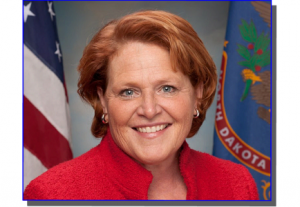 Jamestown (CSi) In Jamestown Saturday, U.S. Senator Heidi Heitkamp helped honor the leadership of Michelle Solensky, Joan Morris, Elizabeth E. Kapp and Lynne Tally, and reinforced the need to promote policies that help empower women in North Dakota and around the country.
Jamestown (CSi) In Jamestown Saturday, U.S. Senator Heidi Heitkamp helped honor the leadership of Michelle Solensky, Joan Morris, Elizabeth E. Kapp and Lynne Tally, and reinforced the need to promote policies that help empower women in North Dakota and around the country.
Joining members of the Zonta Club of Jamestown and Stutsman County – a local branch of Zonta International which is dedicated to improving the lives of women through legal, economic, and professional empowerment around the world – Heitkamp helped recognize four Jamestown women for their outstanding leadership. Speaking about the critical role that mutual support from other women has played in her own career and work in public service, Heitkamp discussed the need to support comprehensive efforts that build not just a fairer, more practical work environment for women and their families, but that also reject violence and abuse against women.
Heitkamp said,”Across North Dakota we are blessed with hardworking women who raise families, run businesses, and help lead our state toward policies that will brighten the future of our communities. Jamestown is incredibly fortunate to have so many women, four of whom we’re honoring today, that live and breathe this leadership every day. But they’re also working to pave the path for women just like them so that they, too, can make a difference. Throughout my career in public service, so many women have lent me their guidance and their strength to help me become a better leader, and that’s exactly the type of work the women of the Zonta Club are working to proliferate. In the Senate, I’ve pressed for the same holistic approach to improve the lives of women – from making sure women aren’t paid less than men for the same work and setting more practical standards for working families, to ending the cycle of violence against women. And I’ll keep working – arm-in-arm with my fellow women leaders – to building a stronger country by empowering women and families.”
Heitkamp’s recognition of the leadership of Michelle Solensky, Joan Morris,
Elizabeth E. Kapp and Lynne Tally of Jamestown’s Zonta Club comes on the heels of her work to celebrate International Women’s Day this week, where she encouraged women to strengthen and support one another to grow stronger families and communities.
Since her time as North Dakota’s Attorney General, Heitkamp has worked embolden policies that make North Dakota women and families stronger and safer, by:
Making sure women get equal pay for equal work: Since joining the Senate,
Heitkamp has fought to make sure hard-working women get the pay they deserve and have earned. By cosponsoring the Paycheck Fairness Act . Heitkamp is working to close the significant wage gap that currently exists between men and women in across the country. North Dakota ranks as one of the states with the largest wage gaps between men and women, where women make just 74 percent of what men earn.
Providing a more practical workplace environment for working families: Last month, Heitkamp added her support to legislation that would make sure working families have the flexibility they need to care for their loved ones without risking their jobs. The Family and Medical Insurance Leave (FAMILY) Act would help employees earn partial paid leave in the event of a serious health condition or family event without adding to the federal budget. Currently, less than 35 percent of North Dakota’s working adults can take or afford unpaid leave, while about 46 percent of the state’s private-sector workforce can’t earn a single paid sick day.
Combating violence against women: Since joining the Senate, Heitkamp has built on her work as Attorney General to combat domestic violence and stop those who seek to harm adults and children. The first bill she co-sponsored was the reauthorization of VAWA which she then played a key role in pushing through Congress. Heitkamp authored a key provision in VAWA to address the continuing crisis of violence against women in tribal communities. The provision strengthens the existing programs and provides tribal governments the force they need to prosecute non-Indian perpetrators who commit these crimes on tribal land.












Comments are closed
Sorry, but you cannot leave a comment for this post.